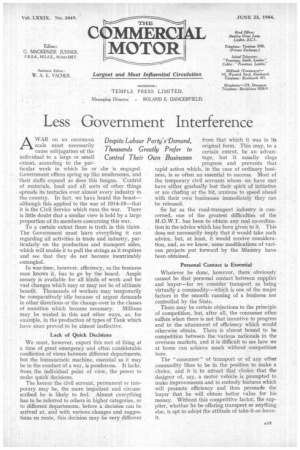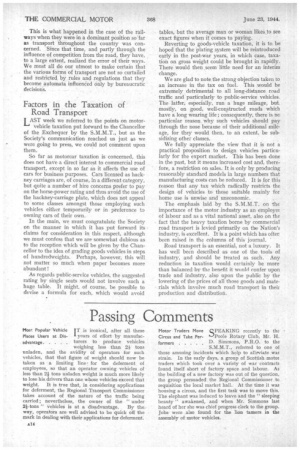Less Government Interference
Page 15

Page 16

If you've noticed an error in this article please click here to report it so we can fix it.
AWAR on an enormous scale must necessarily cause subjugation of the individual to a large or small extent, according to the particular work in which he or she is engaged. Government offices spring up like mushrooms, and their staffs expand as does this fungus. Control of materials, food and all sorts of other things spreads its tentacles over almost every industry in the country. In fact, we have heard the boast— although this applied to the war of 1914-18—that it is the Civil Service which runs the war. There is little doubt that a similar view is held by a large proportion of its members concerning this war.
To a certain extent there is truth in this claim. The Government must learn everything it can regarding all activities in trade and industry, particularly on the production and transport sides, which will enable it to pull the strings as it requires and see that they do not become inextricably entangled.
In war-time, however, efficiency, as the business man knows it, has to go by the board. Ample money is available for all kinds of work and for vast changes which may or may not be of ultimate benefit. Thousands of workers may temporarily be comparatively idle because of urgent demands in other directions or the change-over in the classes of munition which become necessary. Millions may be wasted in this and other ways, as, for example, in the production of types of Tank which have since proved to be almost ineffective.
Lack of Quick Decisions We must, however, expect this sort of thing at a time of great emergency and often considerable confliction of views between different departments, but the bureaucratic machine, essential as it may be in the conduct of a war, is ponderous. It lacks, from the individual point of view, the power to make quick decisions.
The keener the civil servant, permanent or temporary may be, the more impatient and circumscribed he is likely to feel. Almost everything has to be referred to others in higher categories, or to different departments, before a decision can be arrived at, and with various changes and suggestions en route, this decision may be very different from that which it was in its original form, This may, to a certain extent, be an advantage, but it usually clogs progress and prevents that• rapid action which, in the case of ordinary business, is so often an essential to success. Most of the temporary civil servants whom we have met have either gradually lost their spirit of initiative or are chafing at the bit, anxious to speed ahead with their own businesses immediately they can he released.
So far as the road-transport industry is concerned, one of the greatest difficulties of the M.O.W.T. has been to obtain any real co-ordination in the advice which has been given to it. This does not necessarily imply that it would take such advice, but, at least, it would receive consideration, and, as we know, some modifications of various projects put forward by the Ministry have been obtained.
Personal Contact is Essential Whatever be done, however, there obviously cannot be that personal contact between supplier and buyer—for we consider transport as being virtually a commodity—which is one of the major factors in the smooth running of a business not controlled by the State.
There may be certain objections to the principle of competition, but, after all, the consumer often suffers when there is not that incentive to progress and to the attainment of efficiency which would otherwise obtain. There is almost bound to be competition between the various nationals in the overseas markets, and it is difficult to see how we at home can achieve much without competition here.
The " consumer " of transport or of any other commodity likes to be in the position to make a choice, and it is to attract that choice that the designer of, say, a motor vehicle is prompted to make improvements and to embody features which will promote efficiency and thus persuade the buyer that he will obtain better value for his money. Without this competitive factor, the supplier, whether he be offering transport or anything else, is apt to adopt the attitude of take-it-or-leaveit. This is what happened in the case of the railways when they were in a dominant position solar as transport throughout the country was concerned. Since that time, and partly through the influence of competition from the road, they have, to a large extent, realized the error of their ways. We must all do our utmost to make certain that the various forms of transport are not so curtailed and restricted by rules and regulations that they become automata influenced only by bureaucratic decisions.
Factors in the Taxation of Road Transport
LAST week we referred to the points on motor vehicle taxation put forward to the Chancellor of the Exchequer by the S.M.M.T., but as the Society's communication reached us just as we were going to press, we could not comment upon them.
So far as motorcar taxation is concerned, this does not have a direct interest to commercial road transport, except in so far as it affects the use of cars for business purposes. Cars licensed as hackney carriages are, of course, in a different category, but quite a number of hire concerns prefer to pay on the horse-power rating and thus avoid the use of the hackney-carriage plate, which does not appeal to some classes amongst those employing such vehicles either temporarily or in preference to owning cars of their own.
In the main, we must congratulate the Society on the manner in which it has put forward its claims for consideration in this respect, although we must confess that we are somewhat dubious as to the reception which will be given by the Chancellor to the idea of grading goods vehicles in steps of hundredweights. Perhaps, however, this will not matter so much when paper becomes more abundant As regards public-serviee vehicles, the suggested rating by single seats would not involve such a huge table. It might, of course, be possible to devise a formula for each, which would avoid tables, but the average man or woman Iikes,to see exact figures when it comes to paying.
Reverting to goods-vehicle taxation, it is to be hoped that the pla.ting system will be reintroduced early in the post-war years, in which case, taxation on gross weight could be brought in rapidly. There would then _seem little need for an interim change.
We are glad to note the strong objection taken to an increase in the tax on fuel. This would be extremely detrimental to all long-distance road traffic and particularly to public-service vehicles. The latter, especially, run a huge mileage, but, mostly, on good, well-constructed roads which have a long wearing life ; consequently, there is no particular reason why such vehicles should pay through the nose because of their additional mileage, for they would then, to an extent, be subsidizing other classes.
We fully appreciate the view that it is not a practical proposition to design vehicles particularly for the export market. This has been done in the past, but it means increased cost and, therefore, a restriction on sales. It is only by producing reasonably standard models in large numbers that manufacturing costs can be reduced. It is for this reason that any tax which radically restricts the design of vehicles to those suitable mainly for home use is unwise and uneconomic.
The emphasis laid by the S.M.M.T. on the importance of the motor industry as an employer of labour and as a vital national asset, also on the fact that the heavy taxation borne by commercial road transport is levied primarily on the Nation's industry, is excellent. It is a point which has ofter been raised in the columns of this journal.
Road transport is an essential, not a luxury. It has well been described as one of the tools of industry, and should be treated as such. Any reduction in taxation would certainly be more than balanced by the benefit it would confer upon trade and industry, also upon the public by the lowering of the prices of all those goods and materials which involve much road transport in their production and distribution.




















































